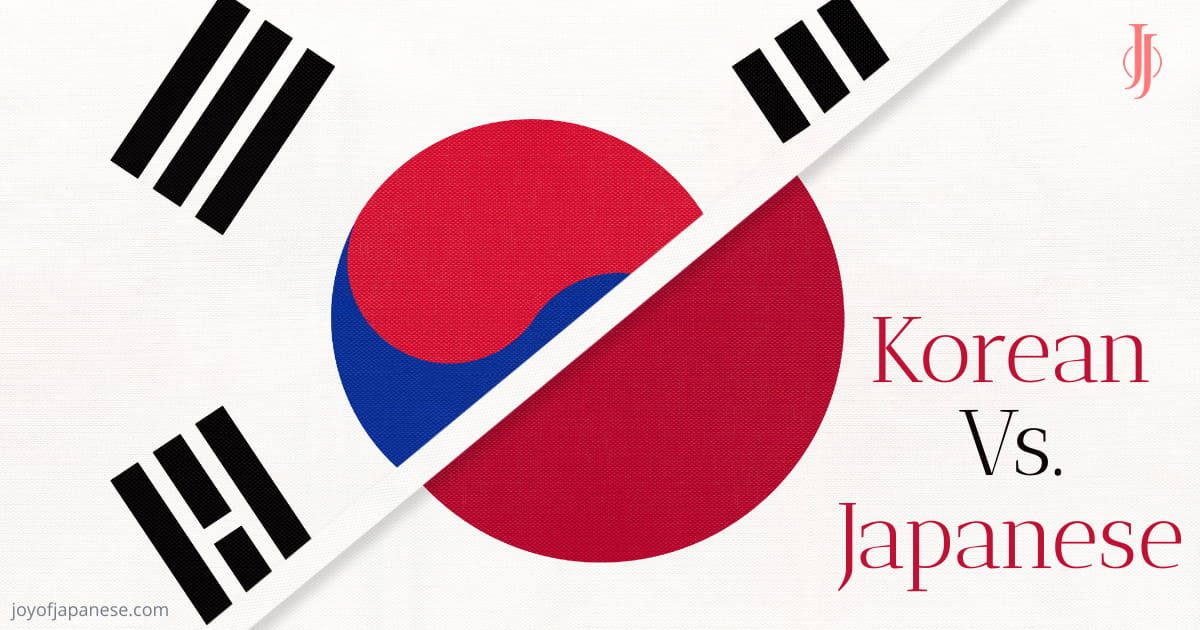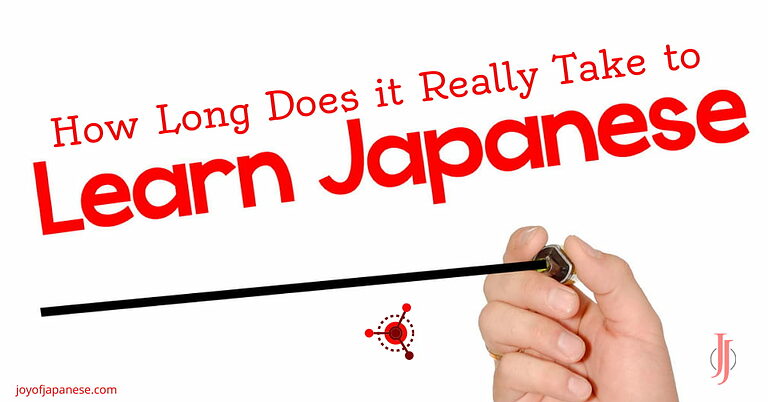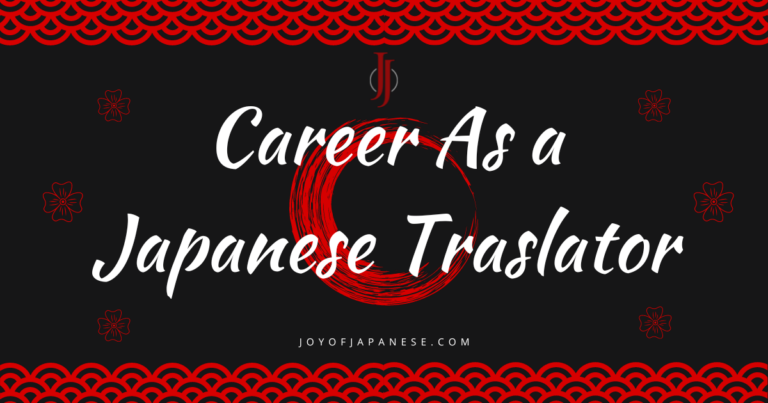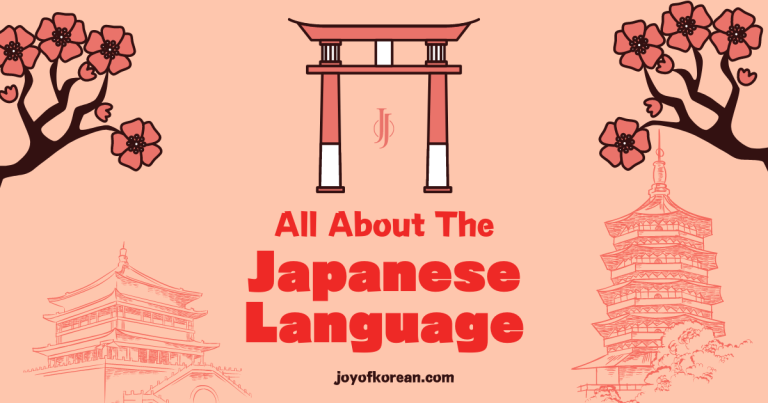Learning a popular language like Japanese or Korean can be exciting and rewarding.
Both languages are rich in culture, lifestyle, and history and can open new opportunities for personal and career growth. It also allows you to connect with people from around the world.
But picking which East Asian language to learn can be challenging, as Japanese and Korean are highly sought-after languages on the global stage. Factors such as your plans, circumstances, and interests are vital in making the right choice.
In this article, we’ll compare the unique advantages and drawbacks of learning Japanese and Korean to help you make an informed decision.
So, if you’re considering learning Japanese or Korean, let’s dive in!
TABLE OF CONTENTS
- What makes Korean or Japanese worth learning?
- Korean Vs. Japanese — Which one to learn?
- Final Words — Korean Vs. Japanese
What makes Korean or Japanese worth learning?
South Korea and Japan are excellent choices if you’re looking for fascinating countries to explore. From their food and culture to their people and festivals, there’s so much to discover and experience.
Both countries are in Far East Asia and have robust economies despite facing challenges in their past. Their rich history influenced their thinking and helped them embrace new technology, leading to global success.
One of the exciting things about visiting Japan and Korea is their unique languages.
Both are top languages globally, providing chances for personal, cultural, and professional advancement. It’s definitely an experience you will remember!

In what ways are the two languages similar and different?
Even though Koreans and Japanese may seem similar because of their shared culture and language, they are actually quite different.
One notable difference is their writing systems. Koreans use a script called Hangul. In comparison, the Japanese use three characters: Hiragana, Katakana, and Kanji. The Kanji comes from Chinese characters.
Another difference is their vocabularies — few words are the same in both languages. They also share some terms that come from various Chinese languages.
Despite these differences, Japanese and Korean grammar are similar.
They use a sentence structure where the subject comes before the object and the verb only at the end. E.g., (Subject-Object-Verb).
They contain particles in regular speech. The way they count and the terms they use for each count are also common.
The particles and markers are crucial as they connect words and help form a sentence’s meaning. Japanese and Korean, despite having different writing systems, share many linguistic similarities.
China’s influence on language history has led to adopting Chinese characters in both languages. As a result, they sound similar to certain words.
Sentence structure and language syntax are also alike in both languages, with almost identical grammar rules.
However, Korean grammar rules are believed to be simpler than those of Japanese grammar. Both languages focus on formal and informal communication, with honorifics being paramount.
Formal language is essential when talking with a stranger or an elder. It is called Jondaemal in Korean and Teineigo and Keigo in Japanese.
The informal language is Banmal in Korean and Kudaketa Nihongo in Japanese. It is used when talking to friends or juniors.
Scripts, Writing, and Reading
The Japanese and Korean languages differ significantly in their writing systems. The Japanese language has 92 letters, while Korean has only around 40.
Japanese uses three writing systems: Hiragana, Katakana, and Kanji.
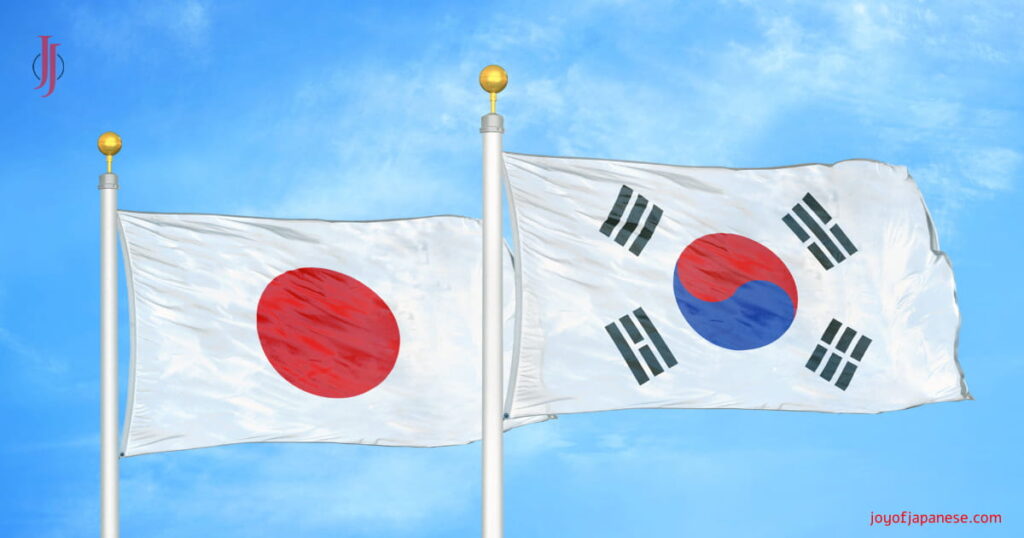
Hiragana and Katakana are syllabaries, each with around 46 characters. Kanji is a collection of over 2000 Chinese characters, each with meaning and pronunciation.
Koreans lack Chinese characters and have eliminated them from the standard language. The original Korean script, Hanja, was wholly based on Chinese logographic characters.
In the early 15th century, the ruler of Joseon introduced a new script called Hangeul to make the language easier for ordinary people.
Hangeul comprises 40 alphabets, including 5 consonants and 11 vowels. It excludes double consonants, which include around 7 characters.
Strokes in Hangeul are necessary and are formed based on the vocal organ. It makes it easier to read and write than in the Japanese language.
As a result, learning Korean writing and reading is easy. The Korean language now has only one writing system—Hangul, a vastly logical alphabet.
However, to learn Japanese, one must learn Kanji in order to read it. Kanji can be found in books, signage, restaurant menus, and computers.
You do not have reasons to learn Mandarin characters in Korean. Thus, learning Japanese writing and reading can be more complex than studying Korean.
Speaking and pronunciation
The Korean language differs from other East Asia languages because it doesn’t have a tonal system. This means that the meaning of a word doesn’t change even if you pronounce it differently.
Japanese use a tonal approach, which implies that the same syllable can have diverse meanings depending on the tone or inflection used. So, it is easier to speak Korean than Japanese, but you must evaluate other factors.
Korean has more varieties of sounds than Japanese, except for one /z/ consonant. So, when you learn Korean, you will discover many Japanese sounds and some new ones.
However, some of these sounds can be hard to distinguish, and some Korean characters sound comparable but have different meanings.
For instance, the Korean alphabet ‘ㄱ’ (said like ‘g’ in ‘again’) and ‘ㄲ’ (said like ‘g’ in ‘gang’) have a very tiny difference in articulation. But it makes a massive difference to the term’s meaning.
Japanese has only five vowels and a few simple consonants, making it easier to pronounce. It is also phonetic, which means you can write any phrase or sentence if you know at least one of the Kana syllabaries.
Korean has a broader range of vowels and consonants, including compound vowels that complicate things. How you say the end of one syllable depends on the starting sound of the following syllable.
Overall, Japanese might be easier to pronounce because of fewer sounds. This can be one incentive for learning Japanese.

How long does it take to become fluent?
The question of how long it takes to learn Korean or Japanese doesn’t have a concrete answer.
Starting from scratch, learning basic Japanese can take around 6 months. You’ll learn to speak, write, and read in Japanese as part of the process.
Once you’ve mastered the basics, you can pass the N5 or N4 of the JLPT or Q5 or Q4 of the NAT-Test.
Everyone learns at their speed so that it might take less or more than six months. The easiest way to become fluent in Japanese is to practice it often.
Luckily, there are many resources, such as books, podcasts, study materials, and apps for learning Japanese.
You can even study Japanese by watching anime and music videos with English subtitles!
If you’re worried about pronunciation or grammar, don’t be! The people of Japan are usually very easygoing and willing to help you out. Just ask!
Learning Korean is different. It takes around 3 years to become fluent in speaking, reading, and writing.
Most people start by focusing on speaking since it’s easier. In contrast, most often start learning Japanese with writing, as learning those aspects of Japanese takes time.
According to FSI research, Japanese and Korean are in Category IV, i.e., Super-hard languages. To gain a noteworthy level, it would take 2200 class hours.
Adding a suggested 1:1 ratio of class and self-study would translate to 4400 hours to reach an advanced level. This is like TOPIK level VI or N1 of the Japanese Language Proficiency Test.
Korean Vs. Japanese — Which one to learn?
Choosing which language to learn, Japanese or Korean, is hard. Each language has benefits and disadvantages, requiring significant time and effort for long-term proficiency.
If you need help to decide, it’s essential to weigh the usefulness and disadvantages of each language and how they align with your interests and goals.
Ask yourself what inspires you to learn one language over the other. Is it for career advancement, personal passion, or cultural interest?
Consider what you hope to achieve by learning either language and which culture or society you are most drawn to. Are you looking to broaden your job prospects or pursue a fun hobby?
If you need help deciding, this article provides all the information you need to decide whether to learn Korean or Japanese.
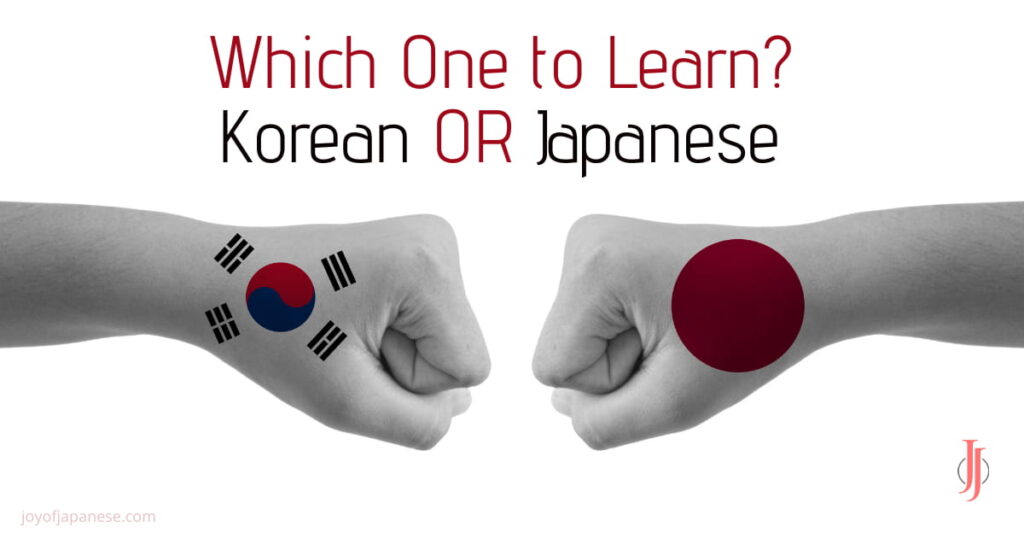
1. Similarities based on your native language
Learning a new language can be an incredible motivator for many people. If your mother tongue is Korean or Japanese, studying either might be easier because of their linguistic similarities.
Because of their proximity and prolonged use, Chinese characters have influenced Japanese and Korean languages. As a result, there are similarities in words, pronunciation, grammar, phrases, and other fundamental parts.
Even though they have similarities, Mandarin and Korean are separate languages and not mutually understandable.
Mandarin knowledge may not be beneficial since Korean and Japanese have grown immensely over the past few centuries.
Learning Korean may be beneficial because of various similarities if you already speak Chinese or Japanese. However, this should not be the sole criterion for choosing which language to learn.
It is also worth noting that Japanese and Korean are viewed as isolated languages. This means they are unrelated to any other known language family.
2. Where is it spoken, and the number of speakers?
Did you know that over 125 million people speak Japanese worldwide, with nearly 124 million native speakers? It’s the eighth most common mother tongue, making studying Japanese valuable.
Japanese is the official language of Japan, where most Japanese speakers live. Yet, there are also sizeable numbers of speakers in countries such as the USA, Brazil, China, South Korea, and more.
Korean, on the other hand, is primarily spoken in North and South Korea.
With over 81 million speakers, it is the official language of both countries. Due to the Korean wave and K-culture, millions of teenagers worldwide study Korean for BTS, K-POP, and other cultural interests.
Since communication with North Korea is limited, only around 50 million South Koreans can converse with them. So, Japanese has significantly more speakers than Korean and is more widely helpful.

The increase in Korean learners has made the difference in speaker numbers less important when deciding between the two languages. Both languages hold unique cultural significance and importance.
3. Global demand, importance, and recognition
Japan has a prosperous economy, and 125 million people speak Japanese, the 13th most common language globally.
In contrast, South Korea has a smaller population but a booming economy. It’s internationally recognized in entertainment, fashion, food, electronics, and cosmetics.
Japanese culture and history have a global reputation, and J-pop culture is popular among Western millennials.
Many people even learn Japanese for songs and are familiar with cultural icons such as Pokemon, Anime, and Manga.
South Korea is a more recent sensation. It has vastly impacted the Hallyu wave, including K-pop, K-dramas, K-food, K-movies, K-beauty, and K-fashion.
Squid Game, Parasite, BTS, Black Pink, and Gangnam Style are well-known worldwide, and many people learn Korean from K-Pop.
South Korea has become a global sensation, winning awards, topping charts, and receiving high ratings worldwide. Even in Japan, South Korean musical groups releasing Japanese albums have gained acclaim among the new generation.
Which culture and language you choose to learn is primarily influenced by personal preference.
4. Career and employment opportunities
Learning Japanese or Korean can lead to various job opportunities depending on your interests and skills.
Both Korean and Japanese languages offer many potential paths.
For example, teaching, translation, sales and marketing, tour guiding, interpreting, writing, customer support, and information technology. You can also work in embassies, consulates, hospitality, international business, and export houses.
Your exact job prospects may vary based on your qualifications. Still, overall, career prospects for Japanese and Korean are vast and varied.
Language skills and relevant expertise can improve job prospects in many areas.
While both languages offer many career and business options, Japan has an advantage over South Korea due to its more extensive economy.
Japan is ranked as the world’s third-largest and second-largest modernized economy after the USA. This makes it an important market for many Western companies.
Japan is home to many big businesses. E.g., Yamaha, Sony, Hitachi, Mitsubishi, Toyota, Nissan, Nippon, Suzuki, Toshiba, Panasonic, Kawasaki, Daikin, Honda, Toyota, Nintendo, Fujifilm, and the list is never-ending!
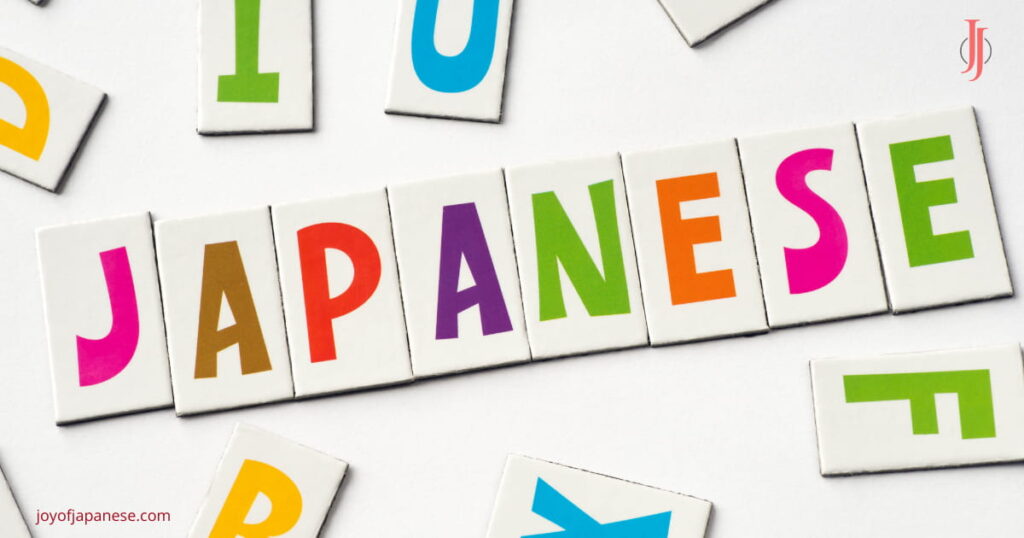
Most Japanese multinationals invest globally in the auto and electronics sectors, making it a good choice for jobs in these industries.
South Korea’s economy is also prosperous, offering many career options for learners worldwide. Samsung, LG, and Hyundai are globally recognized market superpowers.
While both languages are helpful depending on your interest, Japanese is a better choice for animation and gaming.
At the same time, the Korean language offers jobs in various broader entertainment sectors due to the growing popularity of Kpop, K-drama, and K-films.
In some fields, both languages can be valuable, such as in cuisine, tourism, teaching, visiting as a tourist, or studying as a hobby. Language skills and relevant expertise can improve career options in various areas.
5. Ease of learning between Korean and Japanese
The difficulty level of learning Japanese or Korean can vary depending on several factors, such as your native language and previous language learning experiences.
Both languages present challenges, but it is crucial to consider some of their critical features to understand their difficulties.
Regarding speaking, there is little difference in difficulty between Japanese and Korean.
According to FSI, both languages are equally challenging. Achieving the highest proficiency level in Japanese or Korean will take the same time.
Japanese uses three writing systems: Kanji (Chinese characters), Hiragana, and Katakana. Kanji can be tricky due to its many characters and multiple readings for each character.
Korean has a simple and unique writing system called Hangul, which comprises only 24 characters, making it one of the easiest writing systems to learn.
Japanese and Korean grammar differ from English and other Indo-European languages. Word order is relatively flexible, and particles indicate sentence structure.
Honorifics and politeness levels in both languages can affect sentence structure and word choice, making it difficult initially.
Japanese pronunciation is easier for English speakers than for Korean. This is because the sound system is simple, with fewer consonant clusters.
In contrast, Korean has a more complex sound system with more consonant clusters and unique vowel sounds.
Both languages may introduce new concepts and words unfamiliar to English speakers. However, Korean is like other languages in the region, such as Mandarin, which may aid in learning related terms.
Opinions on which language is easier to learn can differ from person to person. Some people prefer Korean because of its intuitive grammar, while others like its simple writing.
Your learning experience for any language will be affected by your willingness to learn, commitment, and immersion in the language through practice.
Final Words — Korean Vs. Japanese
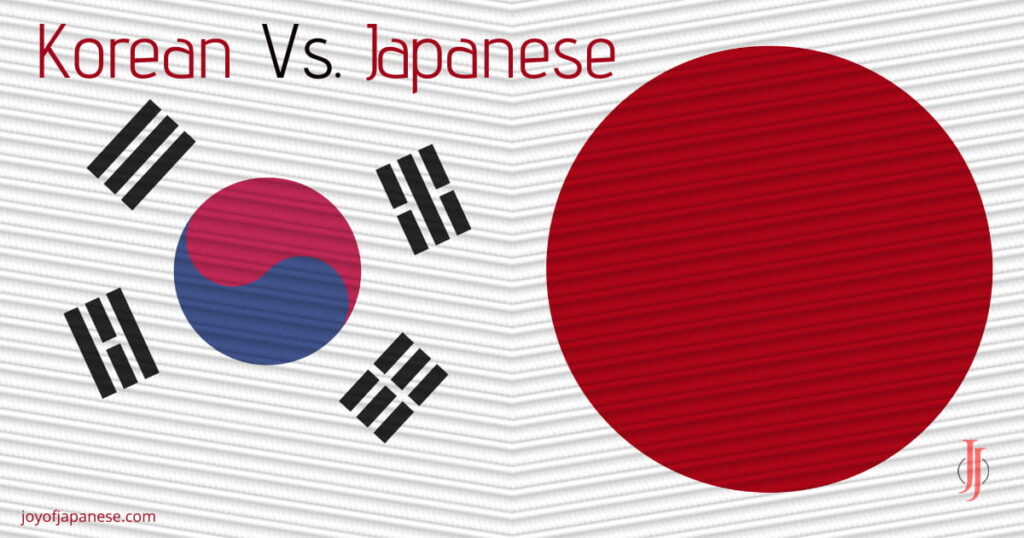
Learning Japanese and Korean can both be rewarding experiences.
Each language has its unique features that offer both simplicity and complexity. While Japanese is more straightforward to speak and listen to, Korean has simpler writing and grammar.
Both languages are highly demanded in the job market. They are globally established (in Japan) or rapidly growing (in South Korea).
Learning one language after the other is also easy because of their similarities. Many also suggest starting with Korean for an easier transition to Japanese.
Eventually, the decision to learn Japanese or Korean should be based on your interests, career aspirations, and future purposes.
Consider your connection to the culture or industry, available resources, and the dedication level required to become proficient in each language.
Regardless of your choice, learning either language can significantly enhance your personal growth and liking for different cultures.
So why not venture on this linguistic journey that will enrich your life? Share your views in the comments below.
